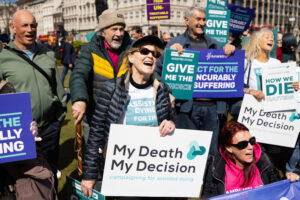
Private Member’s Bill on Assisted Dying: What You Need to Know
Recently, Kim Leadbeater MP announced that she will be introducing a Private Member’s Bill on assisted dying in the House of Commons. This is an important moment for people across the UK, particularly those suffering from incurable conditions, as it opens up the possibility of a new law allowing people more choice and control over how they end their lives.
But what exactly does this mean, and what happens next?
What is a Private Member’s Bill?
A Private Member’s Bill is a proposal for a new law brought forward by an individual Member of Parliament (MP), rather than the government. While most laws are proposed by the government, MPs who are drawn in a special ballot can introduce their own bills. They literally pick numbers out of a glass ball, you can watch the ballot here.

 Kim Leadbeater MP came first in this year’s ballot. Coming first is important, it means that an MP is given time in the parliamentary calendar to change the law – the higher up on the list, the more time and the more chance of success.
Kim Leadbeater MP came first in this year’s ballot. Coming first is important, it means that an MP is given time in the parliamentary calendar to change the law – the higher up on the list, the more time and the more chance of success.
The big announcement that came yesterday is that Kim Leadbeater chose to propose a bill on assisted dying. But the law hasn’t changed yet, and officially, the process hasn’t even started.
What is Assisted Dying?
 Assisted dying means allowing a person who is suffering unbearably from an incurable illness to choose to end their life, with help from a doctor. Currently, assisted dying is illegal in England and Wales, meaning people who want the option to die on their own terms must contemplate attempting risky means or making a costly journey to Switzerland, often alone.
Assisted dying means allowing a person who is suffering unbearably from an incurable illness to choose to end their life, with help from a doctor. Currently, assisted dying is illegal in England and Wales, meaning people who want the option to die on their own terms must contemplate attempting risky means or making a costly journey to Switzerland, often alone.
Many people with conditions like Multiple Sclerosis, Huntington’s Disease, or Locked-in Syndrome experience immense suffering for years. While previous attempts to change the law have focused on those with only six months or less to live, this new Bill could be a chance to help more people, including those suffering with incurable but non-terminal conditions.
Why is this Important?
This Bill could be the most significant chance in a decade to change the law on assisted dying in England and Wales. The Prime Minister has already promised a fair debate and a clear vote on the issue, so there is hope that progress can be made.
However, one concern is that any new law might only apply to people who are already terminally ill, possibly limited to those with six months or fewer to live. My Death, My Decision believes that this would exclude many people who are suffering severely from non-terminal conditions. We want to make sure that everyone who experiences intolerable suffering, regardless of how close they might be to the end of life, has the right to choose when and how they die.
What Happens Next?
 There’s been a lot of confusion about this, but in brief – the first step hasn’t happened yet.
There’s been a lot of confusion about this, but in brief – the first step hasn’t happened yet.
On 16th October, the short title and long title of the Bill will be read out in Parliament. There won’t be a debate on that day – literally, just the title will be read.
Now if Kim decides to choose a short title and long title that includes the words “terminally ill” – that will make it really hard, maybe impossible, to include people who aren’t dying, but are suffering unbearably, in the Bill. Assisted dying is a complex issue, and we believe it deserves a broad debate, looking at systems that exist in many countries.
After this, the next steps will involve debates in Parliament where MPs will discuss the details of the Bill. If enough MPs support it, the Bill will move through several stages, including detailed examination and possible changes, before it can become law.
We don’t know the dates of these stages yet – but because Kim Leadbeater came first, it’s likely the first debate will come before the end of the year.
My Death, My Decision will continue to push for an assisted dying law that gives people the right to die with dignity, at a time of their choosing, and with proper safeguards in place. We encourage anyone who cares about this issue to contact their MP and make their voice heard.
This is a moment for compassion, choice, and dignity. Let’s hope Parliament seizes this opportunity to bring real change.
Trevor Moore, Chair of My Death My Decision, said:
“The introduction of an assisted dying Bill in the House of Commons is a significant and long-awaited step, made even more promising by the Prime Minister’s firm commitment to ensure a full, open debate and decisive vote. The nation stands on the brink of a profound and compassionate shift in how we provide dignity of choice for people who are intolerably suffering.
However, proposals presented to Parliament previously have limited the choice of help to die to those who are terminally ill, with fewer than six months to live. A Bill drawn on that basis would not only constrain proper debate from the outset, but any law would then exclude help to those who are suffering unbearably from incurable conditions like Multiple Sclerosis and Huntington’s Disease, among others. At My Death, My Decision we therefore urge politicians to ensure that people in those circumstances be considered too, so that they have the right to receive help to end their suffering at a time of their choosing.”
Notes:
Members of the MDMD team, as well as individuals affected by the current law on assisted dying, are available for interview upon request.
For further comment or information, media should contact Nathan Stilwell at nathan.stilwell@mydeath-mydecision.org.uk or phone 07456200033.
Media can use the following press images and videos, as long as they are attributed to “My Death, My Decision”.
My Death, My Decision is a grassroots campaign group that wants the law in England and Wales to allow mentally competent adults who are terminally ill or intolerably suffering from an incurable condition the option of a legal, safe, and compassionate assisted death. With the support of over 3,000 members and supporters, we advocate for an evidence-based law that would balance individual choice alongside robust safeguards and finally give the people of England and Wales choice at the end of their lives.

